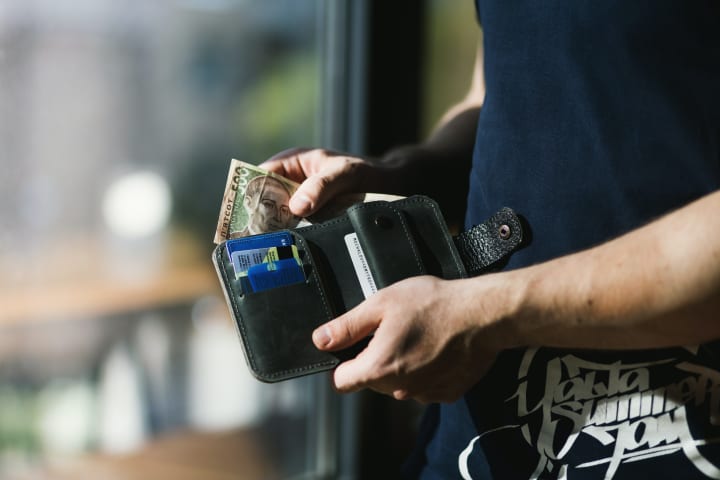Cryptocurrency Wallet Explained
Crypto wallets are digital entities that helps users store their crypto-related public and private keys securely. Cryptocurrency wallets also help users buy and sell, access, and manage their crypto holdings.

The term "cryptocurrency wallet" may refer to either a software program or a physical server. This kind of wallet not only keeps your cryptocurrency but also makes it possible to transmit and receive transactions using cryptocurrency. Either software or hardware may be used in the production of wallets. The private key and the public key are two distinct key pairs that make up a cryptocurrency wallet.
These keys are referred to by their respective names. The private key may be used to produce a public key, which can then be used as the address to which bitcoin should be transmitted to deposit it into a wallet. This can be accomplished by using the public key that was generated with the private key.
Understanding the Phrase Crypto “Wallet”
When discussing cryptocurrencies, what precisely does one mean when they talk about their "wallet"?
A cryptocurrency wallet is a piece of software that users of virtual currencies may install on their devices to securely store and access their digital assets. Users of virtual currencies may install a cryptocurrency wallet to store and access their digital assets. It is not required to have a wallet to spend cash, just as it is not necessary to have a wallet to use conventional money. Read more about buying cryptocurrency.
However, having the best crypto wallet may help you keep all your cash in one spot if you choose to keep track of it that way. When a user acquires cryptocurrency, such as bitcoins, the user has the option of keeping the cryptocurrency in a cryptocurrency wallet, and once the user has access to the cryptocurrency wallet, the user may then use the cryptocurrency to perform transactions.
History Behind Cryptocurrency Wallets

In 2009, when Satoshi Nakamoto disclosed the Bitcoin protocol for the very first time, he also gave the world the very first cryptocurrency wallet. Although Bitcoin is by far the most well-known and widely used cryptocurrency; nevertheless, new cryptocurrencies have emerged that build upon the blockchain technology that Bitcoin pioneered. A cryptocurrency wallet may carry any of these cryptocurrencies in addition to Bitcoin. Wallets are digital storage devices that may hold a variety of different cryptographic currencies.
When you want to get bitcoin, whether by purchasing it at a currency exchange or obtaining it as a gift or as income, you direct the sender to a one-of-a-kind cryptographic address that is provided by the wallet. This address is unique to you and your transaction. When the wallet is first formed, this address is generated for it. The information that is stored on the wallet only points to the location of your cash on the blockchain, which is a public ledger that records and authenticates all transactions.
Although you might picture your cryptocurrency as stored on the wallet in the same way that files are stored on a USB drive, this is not the case. The information that is stored on crypto wallet only points to the location of your cash on the blockchain. To spend bitcoin using the wallet, one only must scan a QR code shown by a shop or transmit a predefined amount of cryptocurrency to the retailer's public address. This process is straightforward.
How do cryptocurrency wallet’s function?

To talk in more general terms, cryptocurrency wallets can be either software or hardware-based. Even if the operation of each type is a little bit different, they are all meant to let you safely access any bitcoin or altcoin that you have in your possession.
It is essential to keep in mind that a cryptocurrency wallet does not store any digital cash. Instead, it stores the information required to carry out cryptographic transactions, including both the public and private keys. The coin itself is kept on a blockchain, which is a form of digital ledger that underpins the operation of numerous decentralized cryptocurrencies. This serves as the foundation for how these cryptocurrencies are traded.
What's the difference between public and private keys?
Public keys and private keys are the two kinds of keys that are often used by crypto wallets.
•PUBLIC KEYS
Public keys function in a manner that is like that of your bank account number. A public key consists of a very long string of random numeric characters. Examples of such parties include a cryptocurrency exchange. It is common practice to use a wallet address, which is simply a compressed form of the wallet's public key, to receive bitcoin during a transaction. This key enables you to do so.
•PRIVATE KEYS
On the other hand, private keys should never be shared with anybody else under any circumstances. If you have a private key, you will be able to access the cryptocurrency that is stored on the blockchain. Therefore, if someone gets access to your private keys, it is the same as if they had access to the cryptocurrency that is stored in your wallet.
How are transactions of cryptographic money carried out from inside your cryptocurrency wallet?
The procedure of sending bitcoin to another wallet is a rather easy one to complete. Once you have the recipient's wallet address, you can open your own cryptocurrency wallet, choose how much digital currency you desire to gift, and then transfer it to the recipient's address. Once you have the recipient's wallet address, you may send cryptocurrency.
Different Types of Crypto Wallets
Hot and Cold Wallets
Basically, crypto wallets are divided into two – Hot Wallets & Cold Wallets. Even though each of these wallets has their own advantages and disadvantages, the one you choose should be dependent on the goals that you have in mind. Take, for instance:
If you want to engage in day-to-day crypto trading, ease of access will be of the utmost significance; hence, a hot wallet is most likely the best option for you to use. On the other hand, if you want to keep a significant number of cryptographic assets and choose safety above use, then purchasing a cold wallet could be the best course of action for you to take.
Custodial and Non-Custodial Wallets
Both custodial and non-custodial wallets have advantages and disadvantages that set them apart from one another and make them suited for the following categories of users:
Since an exchange or custodian is likely to have superior security measures and backup alternatives, it makes more sense to use a custodial wallet if you are prone to losing passwords and devices. This is because an exchange or custodian is more likely to offer these choices. Because of this, it is a popular choice among newcomers who have little or no prior expertise in trading cryptocurrencies.
In addition, the transaction costs associated with using a custodial wallet are often much lower or may even be waived entirely. On the other hand, if you wish to keep complete authority over your own money, you might think about using a wallet that does not hold your money in custody.
The Bottom Line
The storage mechanism you choose to utilize for your cryptocurrency will determine how secure it is. Although it is theoretically possible to keep cryptocurrency directly on an exchange, doing so is not recommended unless the quantity being stored is very low or if the trader intends to make frequent transactions.
When dealing with higher sums, it is advised that the bulk of the funds be moved to a cryptocurrency wallet, regardless of whether the wallet is hot or cold. You will retain complete authority and control over your own cash as well as ownership of your private keys if you proceed in this manner.





Comments
There are no comments for this story
Be the first to respond and start the conversation.